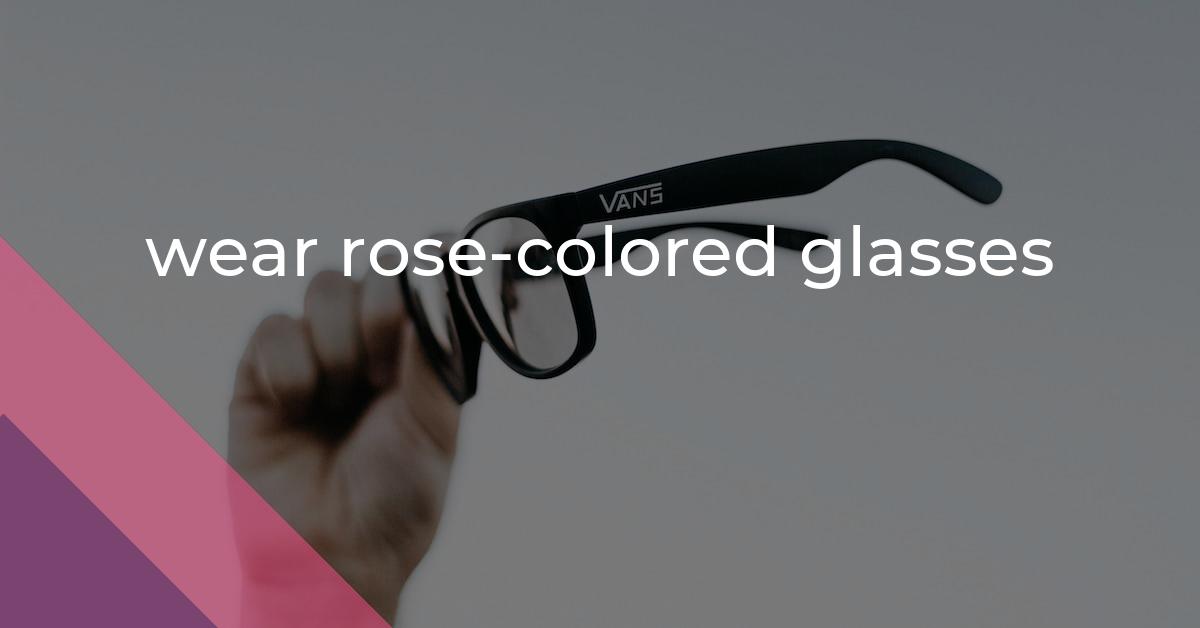wear rose-colored glasses: Idiom Meaning and Origin
What does ‘wear rose-colored glasses’ mean?
The idiom wear rose-colored glasses means to have a positive or optimistic view of something, often to the point of ignoring or minimizing negative aspects.

Idiom Explorer
The idiom "take a dim view of" means to disapprove or have a negative opinion of something or someone.
The idiom *sugarcoated* means to make something seem more pleasant or attractive than it actually is, often by downplaying the negative aspects. It is often used to describe a way of presenting information or opinions in a way that is overly optimistic or rosy.
The idiom "sugar coated" refers to the act of making something appear more pleasant or attractive than it really is.
"Stars in one's eyes" is an idiom that means to have a sense of excitement, wonder, or idealism. It is often used to describe someone who is overly optimistic or has unrealistic expectations about something.
The idiom "smell like a rose" means to have a positive and favorable reputation or to appear innocent, even in a questionable situation.
The idiom "silver-lined" refers to finding a positive aspect or a glimmer of hope in a difficult or unfortunate situation.
The idiom "see things" means to perceive or experience something in a particular way, often different from reality. It implies a subjective understanding or interpretation of a situation or event.
The idiom "see the trees through the forest" means to focus on small details and lose sight of the overall picture or main idea. This can happen when someone becomes too absorbed in the minor aspects of a situation and fails to understand the larger context or objective.
The idiom "rose-tint" refers to viewing or perceiving something in an overly optimistic or idealistic manner.
Decoding Delusion
One of the most commonly used idioms in the English language is "wear rose-colored glasses". This phrase is often used metaphorically to describe someone who has a tendency to see only the positive aspects of a situation, often ignoring or minimizing any negative or potential risks. The idiom, which originates from the literal meaning of wearing glasses with rose-tinted lenses, has become a popular way to describe optimism or a positive outlook.
While the exact origin of the idiom is unclear, it is believed to have originated in the early 19th century. The phrase "rose-colored" refers to the romantic notion of seeing the world through a rosy lens, where everything appears beautiful and perfect. The use of glasses in the idiom emphasizes the idea that this optimistic view is deliberate and intentional, as if the person is physically wearing a filter to see the world in a positive light.
Over time, the phrase "wear rose-colored glasses" has become deeply ingrained in the English language and used in various contexts. It can be used to describe someone who is overly optimistic or oblivious to potential dangers or challenges. Additionally, it can be used to criticize someone for their idealistic and naive perspective, suggesting that they are not being realistic or pragmatic. These related idioms, such as "rose-colored glasses," "rose-coloured," "rose-tint," or "paint a rosy picture," all convey a similar idea of viewing the world through an optimistic lens.
The idiom has become so popular that it has even been adopted in other languages, often with a similar meaning. In French, for example, the equivalent phrase is "voir la vie en rose," which translates to "seeing life through rose-colored glasses." This highlights the universal appeal and relevance of the idiom, as the concept of seeing the world in a positive light transcends cultural boundaries.
However, it is important to note that while wearing rose-colored glasses can be seen as a positive attribute in some situations, it can also have its drawbacks. Ignoring or downplaying potential risks or challenges can lead to poor decision-making or a lack of preparedness. It is crucial to maintain a balance between optimism and realism, acknowledging both the positive and negative aspects of a situation. In other words, it's important not to "love goggles" the situation, as the saying goes.
When we "wear rose-colored glasses," we are actively choosing to focus on the positive aspects of a situation and downplay the negative. This can be a valuable tool for maintaining a positive outlook, but it can also cloud our judgment and prevent us from seeing the full picture. It's important to remember that life isn't always "rosy," and being aware of potential challenges allows us to be better prepared and make more informed decisions. So while it's nice to "paint a rosy picture" of the world, we must also be mindful of the reality beyond our tinted lenses.
The idiom "wear rose-colored glasses" is a powerful metaphor for optimism and idealism. It encapsulates the notion of intentionally seeing the world through a positive lens, often disregarding any negative or potential risks. While the exact origin of the idiom is uncertain, its popularity and widespread usage highlight its relevance in contemporary English. It reminds us to look on the bright side, but also encourages us to balance our optimism with a dose of reality. When we fix our gaze solely on the positive, we risk missing out on important details or failing to anticipate challenges. So let us continue to appreciate the optimism that "wearing rose-colored glasses" represents, but let us never forget the importance of seeing the world as it truly is.
Example usage
Examples:
- She wore rose-colored glasses throughout her entire relationship, ignoring all the warning signs of his unfaithfulness.
- He tends to wear rose-colored glasses when it comes to politics, always seeing the positive side of every decision made by his favorite politician.
- Despite the company's financial troubles, the CEO continued to wear rose-colored glasses and insisted that everything was going well.
The idiom "wear rose-colored glasses" is used to describe someone who has an overly optimistic or idealistic view of a situation, ignoring any negative aspects or realities. It implies that the person is seeing things in a distorted or excessively positive way, as if looking through rose-colored lenses that tint everything with a rosy hue. The expression can be used to describe various scenarios, such as relationships, politics, or business, where a person's optimistic perspective might hinder their judgment or awareness of potential problems.
More "Optimism" idioms



